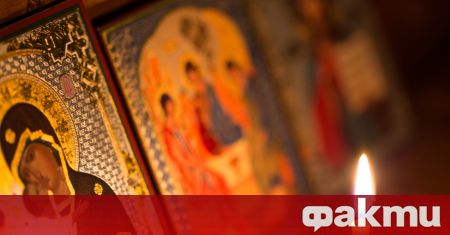Today the Orthodox Church honors St. Dometius and the Sunday after Pentecost. Dometius’ story is quite exciting.
He was born in Persia as a pagan in the time of Constantine the Great. As a child, he became acquainted with the faith of Christ, abandoned paganism, and was baptized. He loved the true faith so much that he left everything secular and became a monk in a monastery near the city of Nizibia, writes BLIC.
After living here for some time, he wished to indulge in a silent life. So he left the monastery and went to a deserted mountain, where he settled in a cave. Through fasting, prayer, vigil, and godliness, he attained such holiness and perfection that he was healed of all diseases. Julian the Apostate came within these limits.
He heard of Dometius and sent men to wall the hermit in the cave alive, along with two of his disciples. Thus, this man of God ended his life and moved to the Kingdom of heaven. This happened in 363.
Saint Dometius lived during the reign of Constantine the Great. His homeland was Persia, where he was converted from paganism to Christianity by a man named War. Leaving his relatives and his homeland, permeated by pagan wickedness, St. Dometius set out for the Greek state, in the city of Nizibia.
Here he went to a monastery and received Holy Baptism, and then he put on a monastic image and passed the feat of the fasting life immaculately.
But due to the suggestions of the envious and cunning rage, the monks living in this monastery hated him and St. Dometius was forced to flee to the monastery of the holy martyrs Sergius and Bacchus, which was located in the city of Theodosiopolis. Here he imitated the life of Archimandrite Nurvel, who is said to have tasted nothing boiled for sixty years, slept extremely little, not lying down or sitting, but standing, leaning on his staff.
Archimandrite Nurvel appointed the Venerable Dometius deacon, but when the saint realized that the archimandrite wanted to make him a priest, he fled. Alone in a desert mountain, St. Dometius led a life of God, enduring heat and cold and all kinds of adversity. Then he settled in a cave and performed many miracles in the name of Christ: he healed from sickness many who came to him, while at the same time attracting them from idolatry to the faith of Christ. And when Julian the Apostate came to this area and after learning all about St. Dometius, he ordered him to be stoned.
Those sent to commit this atrocity came and found in the third hour of the day the holy old man, who, together with two disciples, was performing the prescribed prayers. They attacked them, stoned them, and thus the Venerable Dometius ended his godly life with his two disciples.
Meanwhile, the church also celebrates the Sunday after Pentecost. There have been times of peace in the history of the Church of Christ, when everyone can freely and peacefully confess Christ to men.
But there have also been times of fury when enemy forces rise up against the Church and when those who profess Christ must be willing to endure persecution and even sacrifice their lives. In our time there are persecutions against the Church of Christ in many places, and even where there are none, some Christians do not consider it necessary to profess their faith.
Here is what Christ said about those who openly declared to be His followers: “Whosoever shall confess me before men, him will I confess also before my Father which is in heaven; And whosoever shall deny me before men, him will I also deny before my Father which is in heaven. it happens that the best and most deserving actors are not appreciated by men, but on the contrary – are persecuted and blasphemed, although others enjoy the fruits of their labor.
Many scholars and artists, denied and unrecognized throughout their lives, were revered and glorified only after their deaths. But to be recognized by his contemporaries is important only for his earthly life.
However, man is destined for eternity, and only that which matters before God and eternity alone deserves to be the object of our pursuit. If we are recognized by our sons and daughters, if they realize that we have done them good and that we have taken care of them, we can count on spending our old days in peace and contentment.
If a king or ruler is recognized by his subjects, that is, if they realize that they owe their well-being to him, he can be at peace with his throne and his place. If they do not acknowledge him, if they are not grateful to him, he may suffer in this earthly life, but for his goodness he will surely receive a reward from the righteous God.
However, if we do not acknowledge Christ, if we deny Him, we harm only ourselves, because He will not acknowledge us before His Heavenly Father. If we value so much to be recognized by men, how much more should we try to be recognized by God Himself!
And what does it mean to confess Christ before men? – This means that we confess to all that He is our Savior and God. Let us acknowledge Him not only with words, but also with deeds, which will support our confession, so that everyone will understand and say that we are grateful to Him.
Do we acknowledge and confess Christ before men? We usually think that it is enough to go to church on a holiday and listen to the service there, to pass in our eyes and in the eyes of others as good Christians.
How many times do we remember in our conversations to mention the name of Christ and to profess our faith in meetings and everywhere where we communicate with other people?
Unfortunately, there are even those among us who, although they call themselves Christians, are ashamed to confess Christ through men. Some of them without objection listen to attacks against the Christian faith, listen to blasphemies against Christ and are silent, saying nothing to understand that they are Christians, that they acknowledge Christ as their God and Savior.
Such men, though they have not renounced Christ, are ready, even in the slightest persecution, to renounce Him, to renounce their Savior, and to lose eternal life. Christ asks us, His followers, not only to do good, but also to boldly profess our faith in Him.
This is not just an empty requirement. The salvation that Christianity brings is for all people. The gospel must be preached to all nations. And how and who will preach Christ, if everyone hides only for himself his faith and does not show it to the people? The greatest price is the confession and confession of Christ during persecutions.
The ancient Church recognizes as heroes of the spirit, as saints, all those who chose to suffer persecution, torture, even death, rather than deny Christ, their faith in Him. Those who sacrificed their lives are called martyrs, and those who endured persecution, deprivation, imprisonment, who were tortured and survived the persecution are called confessors.
Today we celebrate the memory of all these martyrs and confessors and all those who preferred Christ to their loved ones, to the riches that this world gives, to the comforts and honors that they could keep if they denied Christ. There are many examples in the lives of the saints of persons who renounced all earthly things in order to follow Christ.
Reverend men and women differed from other Christians in that they left everything in the world and devoted themselves only to the service of God. They all left brothers, sisters, father, mother, houses and fields for the name of Christ, but they received all these a hundredfold, and inherited eternal life. For example, St. John of Rila, the protector of the Bulgarian people, left home and property and settled in the Rila Desert on fasting and prayer. He left his earthly parents, but was adopted by God. He left brothers and relatives, but attracted around him for an equally holy life hundreds of brothers in Christ.
He did not have a wife and children of the flesh, but all the children of the Bulgarian people from his time until today declared themselves his children. He gave up his home and fields, but the largest monastery on the Balkan Peninsula was built in his name, with properties thousands of times more extensive than what he left at home.
The same is true of the apostles, whom the whole Christian world honors, of the holy silversmiths, of the great saints, and of all the saints. St. The Church has wisely ordered on the first Sunday after Pentecost to present before our eyes the innumerable number of saints who, by the power of the grace of St. Spirit worked miracles, spread the gospel, and set an example for all of us with their lives.
This is done, on the one hand, to encourage us, to remind us that the power of God is always at work in the world, that at all times and in all circumstances the saints shine in the Church.
On the other hand, today’s holiday reminds us that all of us, today’s Christians, can be among the saints. Not all of us can perform such feats as the apostles, martyrs, and venerable saints.
But each of us can and must confess in word and deed our faith in Christ and ask the saints to intercede for us before God – to fulfill our Christian duty to Him and to those in need of our help and to inherit eternal life. Amen.
Today, everyone who bears the beautiful names Valerie and Valeria has a reason to drink.
1. The name Valerie is Latin and means healthy.
2. People with this name combine two opposite characters.
3. On the one hand, Valerie can be naughty and risk-averse, and on the other hand dreamy and very vulnerable.
4. These men are looking for a profession that allows them to travel often.
5. People with this name are very curious and full of positive energy that helps them make new friendships.
6. The only thing they need to learn is concentration, because distraction will hinder them, both in the profession and in personal life.
Valerie has several name days:
January 21 – Prep. Maxim the Confessor. St. mchk. Neophyte
June 7 – St. svshmchk Theodotus, ep. Anchor. St. Martyr Valeria
August 7 – Pentecost. St. прпмчк Дометий. St. martyr Potamia
–


